Ethics: The Case of Amanda Todd, Anonymous, and Cyberbullying
VerifiedAdded on 2023/04/26
|6
|1312
|99
Essay
AI Summary
This essay examines the tragic case of Amanda Todd, who committed suicide after enduring extensive online bullying. It explores the ethical and legal accountability of her anonymous harasser, considering whether the harasser can be held responsible for her suicide. The essay also investigates if the case can be classified as the corruption of a minor, even though the offenses occurred online. Furthermore, it analyzes the actions of the hacker group "Anonymous" in relation to vigilantism and defamation, questioning whether they should be protected or held legally liable for their actions. The essay concludes by summarizing the key ethical and legal considerations raised by the case, emphasizing the devastating impact of cyberbullying and the need for accountability in the digital age.
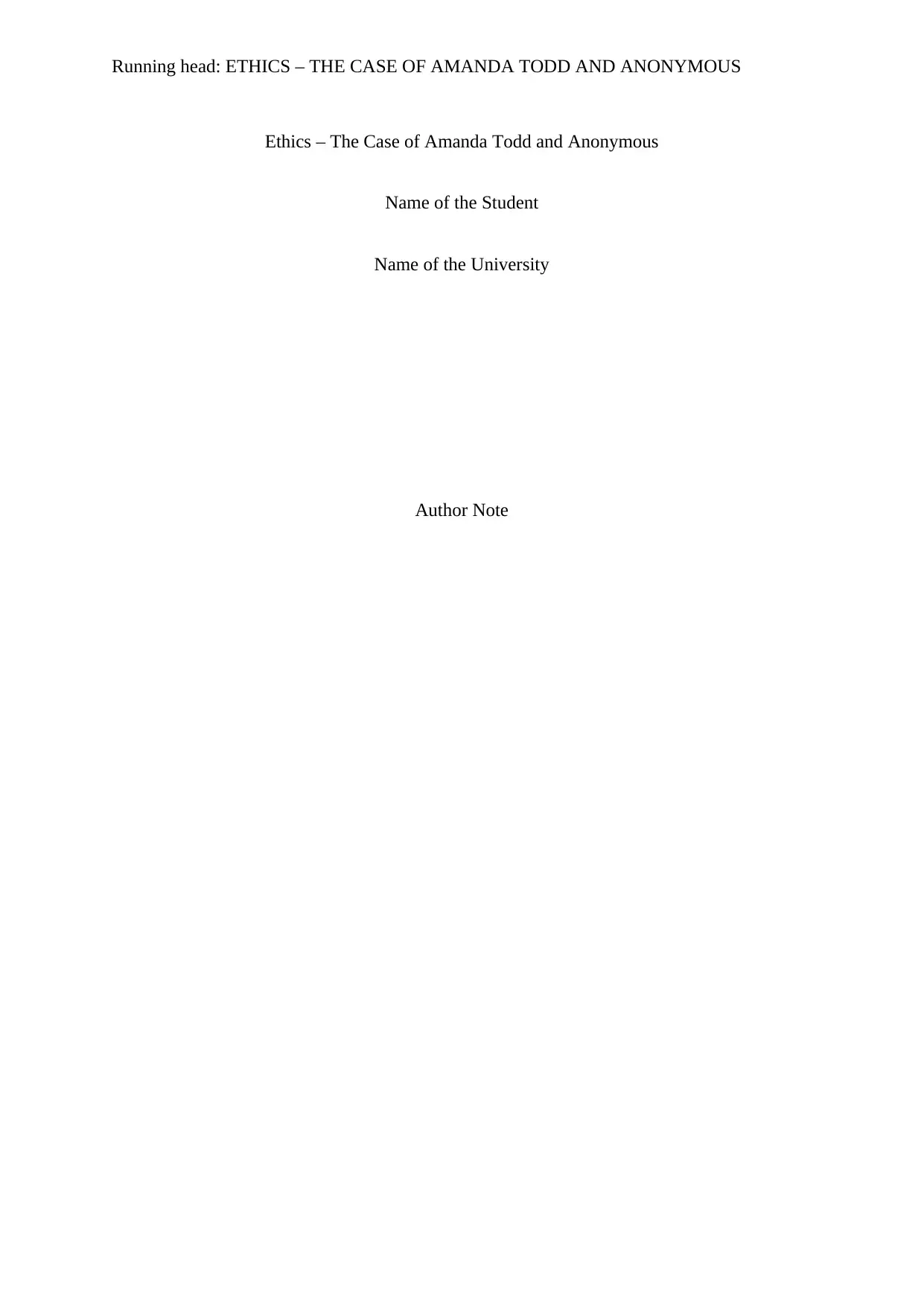
Running head: ETHICS – THE CASE OF AMANDA TODD AND ANONYMOUS
Ethics – The Case of Amanda Todd and Anonymous
Name of the Student
Name of the University
Author Note
Ethics – The Case of Amanda Todd and Anonymous
Name of the Student
Name of the University
Author Note
Paraphrase This Document
Need a fresh take? Get an instant paraphrase of this document with our AI Paraphraser
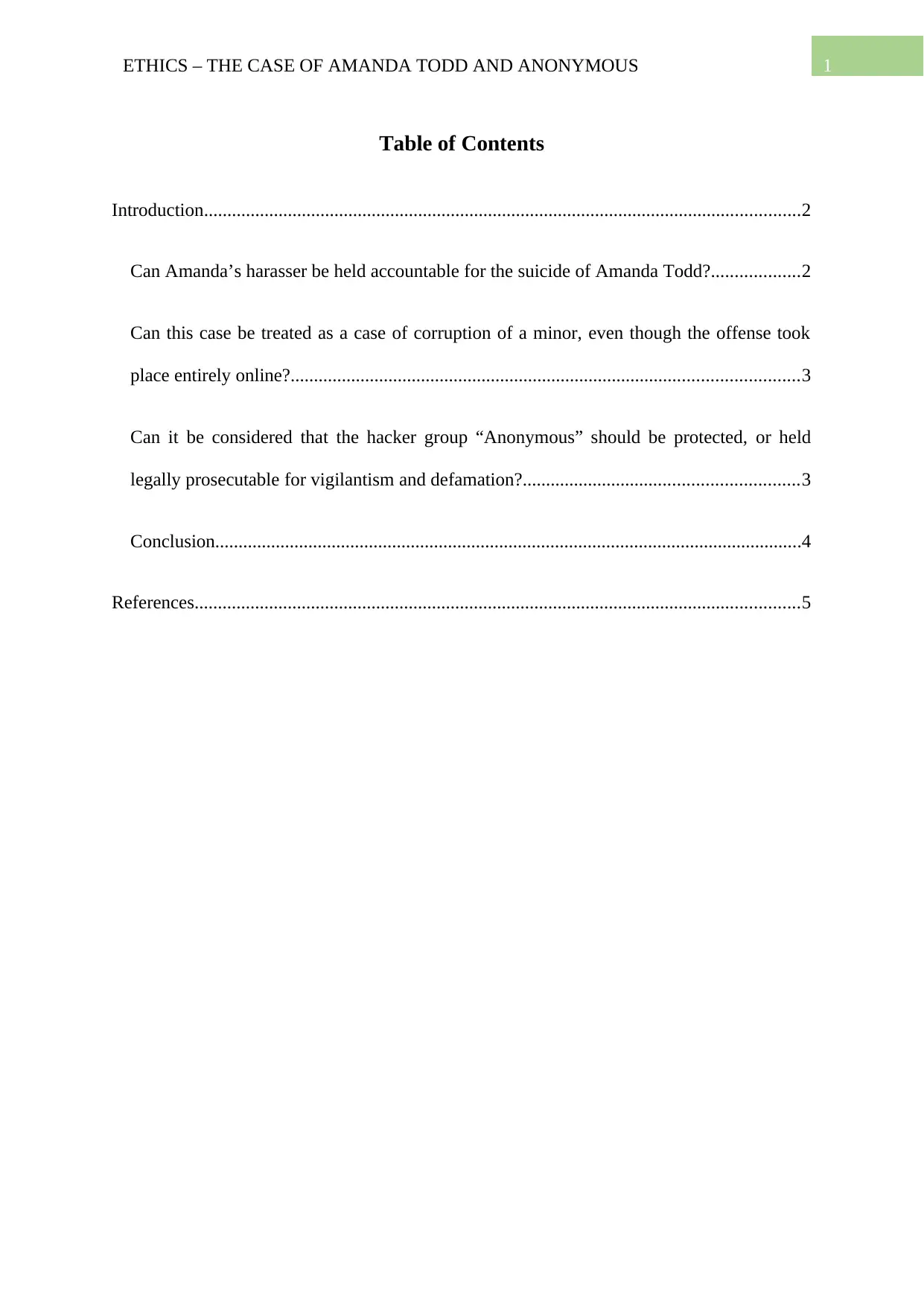
1ETHICS – THE CASE OF AMANDA TODD AND ANONYMOUS
Table of Contents
Introduction................................................................................................................................2
Can Amanda’s harasser be held accountable for the suicide of Amanda Todd?...................2
Can this case be treated as a case of corruption of a minor, even though the offense took
place entirely online?.............................................................................................................3
Can it be considered that the hacker group “Anonymous” should be protected, or held
legally prosecutable for vigilantism and defamation?...........................................................3
Conclusion..............................................................................................................................4
References..................................................................................................................................5
Table of Contents
Introduction................................................................................................................................2
Can Amanda’s harasser be held accountable for the suicide of Amanda Todd?...................2
Can this case be treated as a case of corruption of a minor, even though the offense took
place entirely online?.............................................................................................................3
Can it be considered that the hacker group “Anonymous” should be protected, or held
legally prosecutable for vigilantism and defamation?...........................................................3
Conclusion..............................................................................................................................4
References..................................................................................................................................5
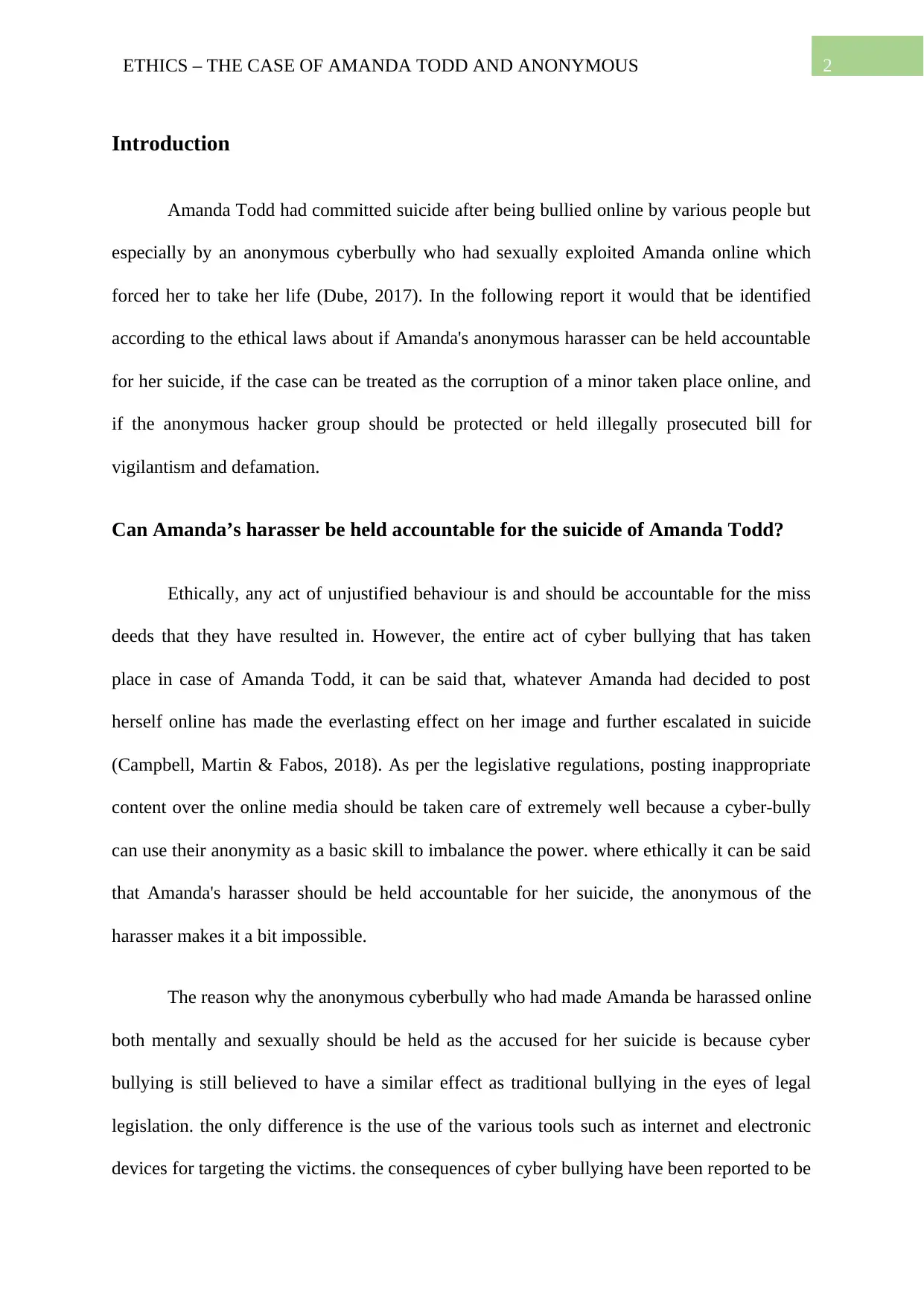
2ETHICS – THE CASE OF AMANDA TODD AND ANONYMOUS
Introduction
Amanda Todd had committed suicide after being bullied online by various people but
especially by an anonymous cyberbully who had sexually exploited Amanda online which
forced her to take her life (Dube, 2017). In the following report it would that be identified
according to the ethical laws about if Amanda's anonymous harasser can be held accountable
for her suicide, if the case can be treated as the corruption of a minor taken place online, and
if the anonymous hacker group should be protected or held illegally prosecuted bill for
vigilantism and defamation.
Can Amanda’s harasser be held accountable for the suicide of Amanda Todd?
Ethically, any act of unjustified behaviour is and should be accountable for the miss
deeds that they have resulted in. However, the entire act of cyber bullying that has taken
place in case of Amanda Todd, it can be said that, whatever Amanda had decided to post
herself online has made the everlasting effect on her image and further escalated in suicide
(Campbell, Martin & Fabos, 2018). As per the legislative regulations, posting inappropriate
content over the online media should be taken care of extremely well because a cyber-bully
can use their anonymity as a basic skill to imbalance the power. where ethically it can be said
that Amanda's harasser should be held accountable for her suicide, the anonymous of the
harasser makes it a bit impossible.
The reason why the anonymous cyberbully who had made Amanda be harassed online
both mentally and sexually should be held as the accused for her suicide is because cyber
bullying is still believed to have a similar effect as traditional bullying in the eyes of legal
legislation. the only difference is the use of the various tools such as internet and electronic
devices for targeting the victims. the consequences of cyber bullying have been reported to be
Introduction
Amanda Todd had committed suicide after being bullied online by various people but
especially by an anonymous cyberbully who had sexually exploited Amanda online which
forced her to take her life (Dube, 2017). In the following report it would that be identified
according to the ethical laws about if Amanda's anonymous harasser can be held accountable
for her suicide, if the case can be treated as the corruption of a minor taken place online, and
if the anonymous hacker group should be protected or held illegally prosecuted bill for
vigilantism and defamation.
Can Amanda’s harasser be held accountable for the suicide of Amanda Todd?
Ethically, any act of unjustified behaviour is and should be accountable for the miss
deeds that they have resulted in. However, the entire act of cyber bullying that has taken
place in case of Amanda Todd, it can be said that, whatever Amanda had decided to post
herself online has made the everlasting effect on her image and further escalated in suicide
(Campbell, Martin & Fabos, 2018). As per the legislative regulations, posting inappropriate
content over the online media should be taken care of extremely well because a cyber-bully
can use their anonymity as a basic skill to imbalance the power. where ethically it can be said
that Amanda's harasser should be held accountable for her suicide, the anonymous of the
harasser makes it a bit impossible.
The reason why the anonymous cyberbully who had made Amanda be harassed online
both mentally and sexually should be held as the accused for her suicide is because cyber
bullying is still believed to have a similar effect as traditional bullying in the eyes of legal
legislation. the only difference is the use of the various tools such as internet and electronic
devices for targeting the victims. the consequences of cyber bullying have been reported to be
⊘ This is a preview!⊘
Do you want full access?
Subscribe today to unlock all pages.

Trusted by 1+ million students worldwide
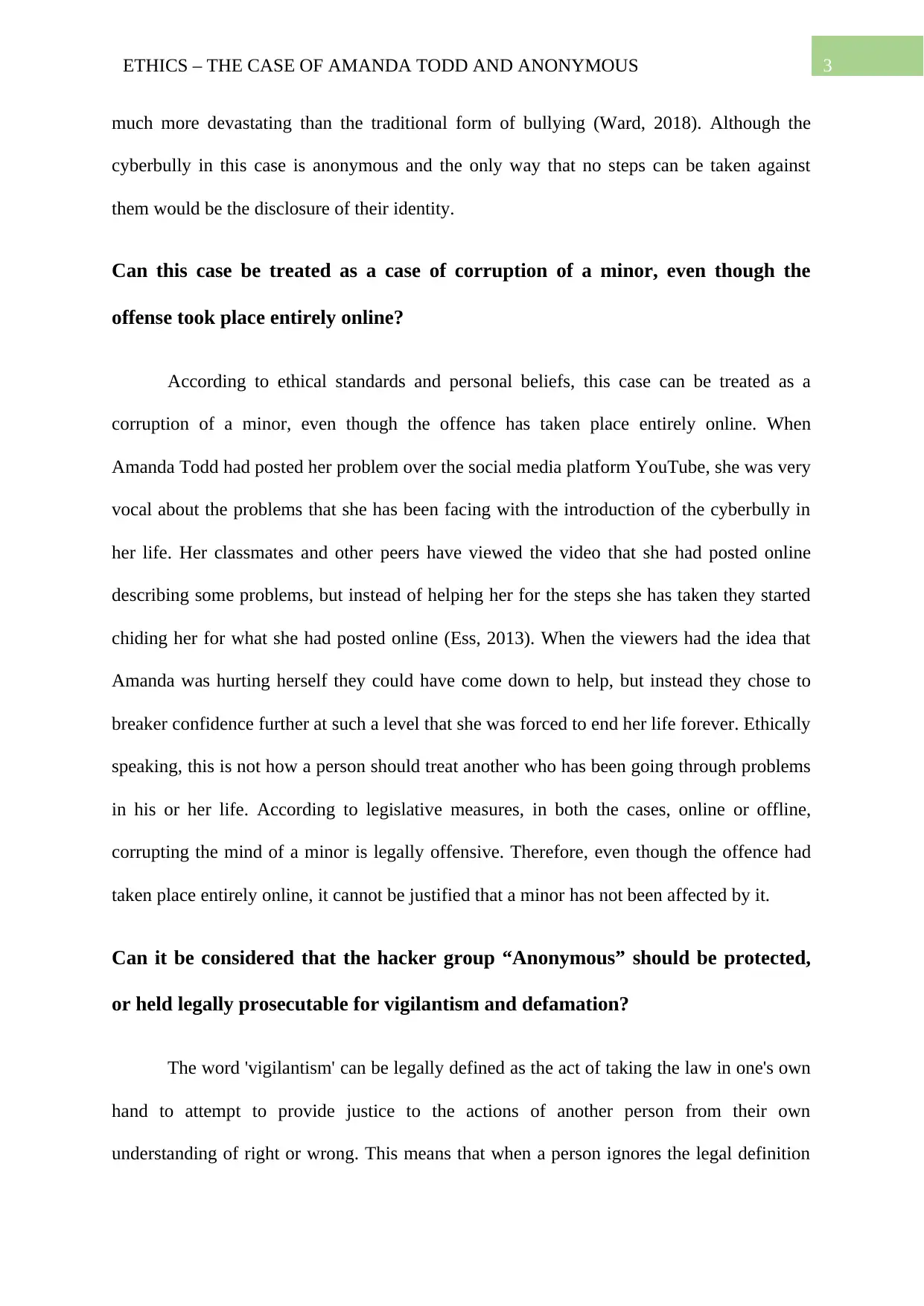
3ETHICS – THE CASE OF AMANDA TODD AND ANONYMOUS
much more devastating than the traditional form of bullying (Ward, 2018). Although the
cyberbully in this case is anonymous and the only way that no steps can be taken against
them would be the disclosure of their identity.
Can this case be treated as a case of corruption of a minor, even though the
offense took place entirely online?
According to ethical standards and personal beliefs, this case can be treated as a
corruption of a minor, even though the offence has taken place entirely online. When
Amanda Todd had posted her problem over the social media platform YouTube, she was very
vocal about the problems that she has been facing with the introduction of the cyberbully in
her life. Her classmates and other peers have viewed the video that she had posted online
describing some problems, but instead of helping her for the steps she has taken they started
chiding her for what she had posted online (Ess, 2013). When the viewers had the idea that
Amanda was hurting herself they could have come down to help, but instead they chose to
breaker confidence further at such a level that she was forced to end her life forever. Ethically
speaking, this is not how a person should treat another who has been going through problems
in his or her life. According to legislative measures, in both the cases, online or offline,
corrupting the mind of a minor is legally offensive. Therefore, even though the offence had
taken place entirely online, it cannot be justified that a minor has not been affected by it.
Can it be considered that the hacker group “Anonymous” should be protected,
or held legally prosecutable for vigilantism and defamation?
The word 'vigilantism' can be legally defined as the act of taking the law in one's own
hand to attempt to provide justice to the actions of another person from their own
understanding of right or wrong. This means that when a person ignores the legal definition
much more devastating than the traditional form of bullying (Ward, 2018). Although the
cyberbully in this case is anonymous and the only way that no steps can be taken against
them would be the disclosure of their identity.
Can this case be treated as a case of corruption of a minor, even though the
offense took place entirely online?
According to ethical standards and personal beliefs, this case can be treated as a
corruption of a minor, even though the offence has taken place entirely online. When
Amanda Todd had posted her problem over the social media platform YouTube, she was very
vocal about the problems that she has been facing with the introduction of the cyberbully in
her life. Her classmates and other peers have viewed the video that she had posted online
describing some problems, but instead of helping her for the steps she has taken they started
chiding her for what she had posted online (Ess, 2013). When the viewers had the idea that
Amanda was hurting herself they could have come down to help, but instead they chose to
breaker confidence further at such a level that she was forced to end her life forever. Ethically
speaking, this is not how a person should treat another who has been going through problems
in his or her life. According to legislative measures, in both the cases, online or offline,
corrupting the mind of a minor is legally offensive. Therefore, even though the offence had
taken place entirely online, it cannot be justified that a minor has not been affected by it.
Can it be considered that the hacker group “Anonymous” should be protected,
or held legally prosecutable for vigilantism and defamation?
The word 'vigilantism' can be legally defined as the act of taking the law in one's own
hand to attempt to provide justice to the actions of another person from their own
understanding of right or wrong. This means that when a person ignores the legal definition
Paraphrase This Document
Need a fresh take? Get an instant paraphrase of this document with our AI Paraphraser
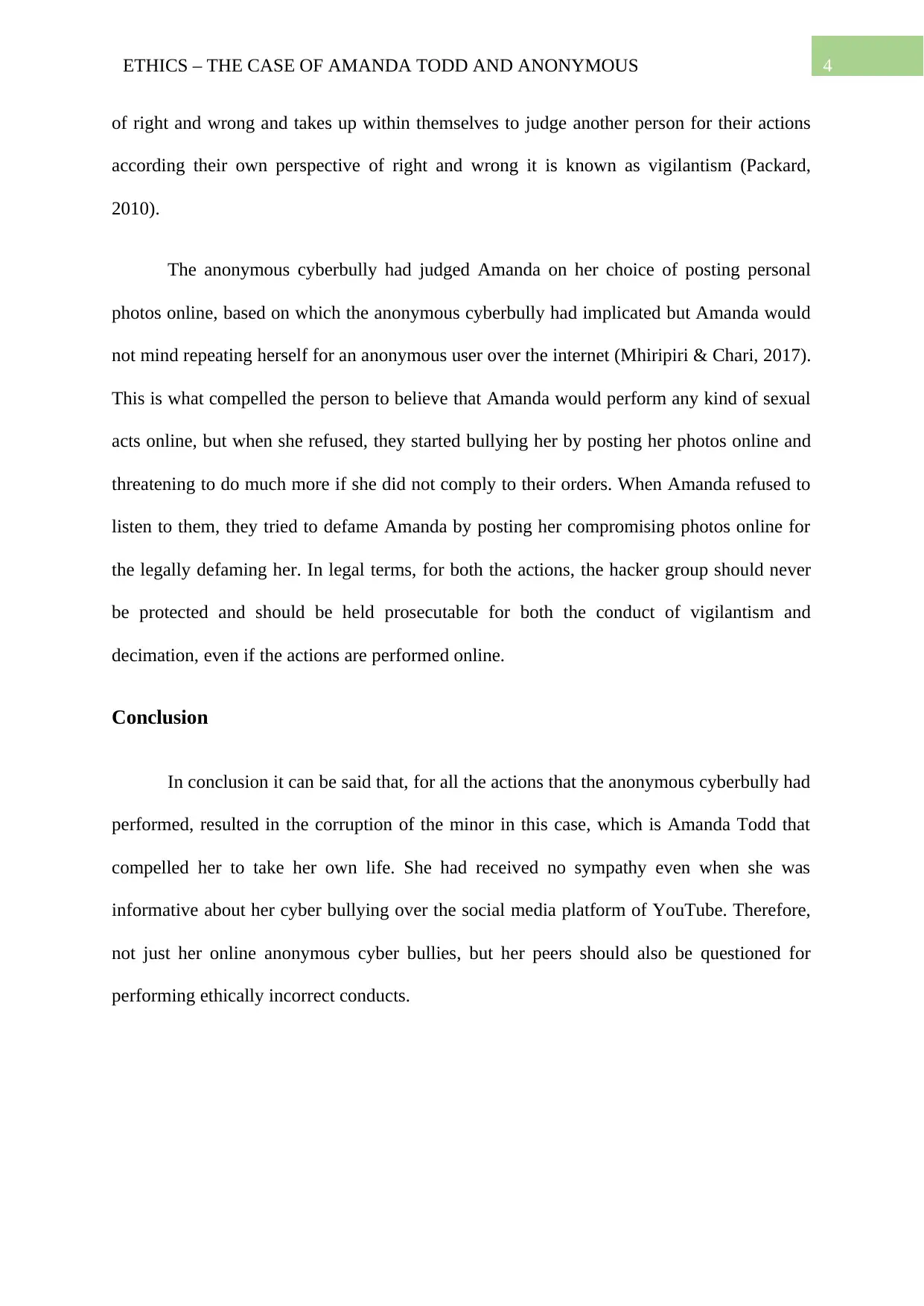
4ETHICS – THE CASE OF AMANDA TODD AND ANONYMOUS
of right and wrong and takes up within themselves to judge another person for their actions
according their own perspective of right and wrong it is known as vigilantism (Packard,
2010).
The anonymous cyberbully had judged Amanda on her choice of posting personal
photos online, based on which the anonymous cyberbully had implicated but Amanda would
not mind repeating herself for an anonymous user over the internet (Mhiripiri & Chari, 2017).
This is what compelled the person to believe that Amanda would perform any kind of sexual
acts online, but when she refused, they started bullying her by posting her photos online and
threatening to do much more if she did not comply to their orders. When Amanda refused to
listen to them, they tried to defame Amanda by posting her compromising photos online for
the legally defaming her. In legal terms, for both the actions, the hacker group should never
be protected and should be held prosecutable for both the conduct of vigilantism and
decimation, even if the actions are performed online.
Conclusion
In conclusion it can be said that, for all the actions that the anonymous cyberbully had
performed, resulted in the corruption of the minor in this case, which is Amanda Todd that
compelled her to take her own life. She had received no sympathy even when she was
informative about her cyber bullying over the social media platform of YouTube. Therefore,
not just her online anonymous cyber bullies, but her peers should also be questioned for
performing ethically incorrect conducts.
of right and wrong and takes up within themselves to judge another person for their actions
according their own perspective of right and wrong it is known as vigilantism (Packard,
2010).
The anonymous cyberbully had judged Amanda on her choice of posting personal
photos online, based on which the anonymous cyberbully had implicated but Amanda would
not mind repeating herself for an anonymous user over the internet (Mhiripiri & Chari, 2017).
This is what compelled the person to believe that Amanda would perform any kind of sexual
acts online, but when she refused, they started bullying her by posting her photos online and
threatening to do much more if she did not comply to their orders. When Amanda refused to
listen to them, they tried to defame Amanda by posting her compromising photos online for
the legally defaming her. In legal terms, for both the actions, the hacker group should never
be protected and should be held prosecutable for both the conduct of vigilantism and
decimation, even if the actions are performed online.
Conclusion
In conclusion it can be said that, for all the actions that the anonymous cyberbully had
performed, resulted in the corruption of the minor in this case, which is Amanda Todd that
compelled her to take her own life. She had received no sympathy even when she was
informative about her cyber bullying over the social media platform of YouTube. Therefore,
not just her online anonymous cyber bullies, but her peers should also be questioned for
performing ethically incorrect conducts.
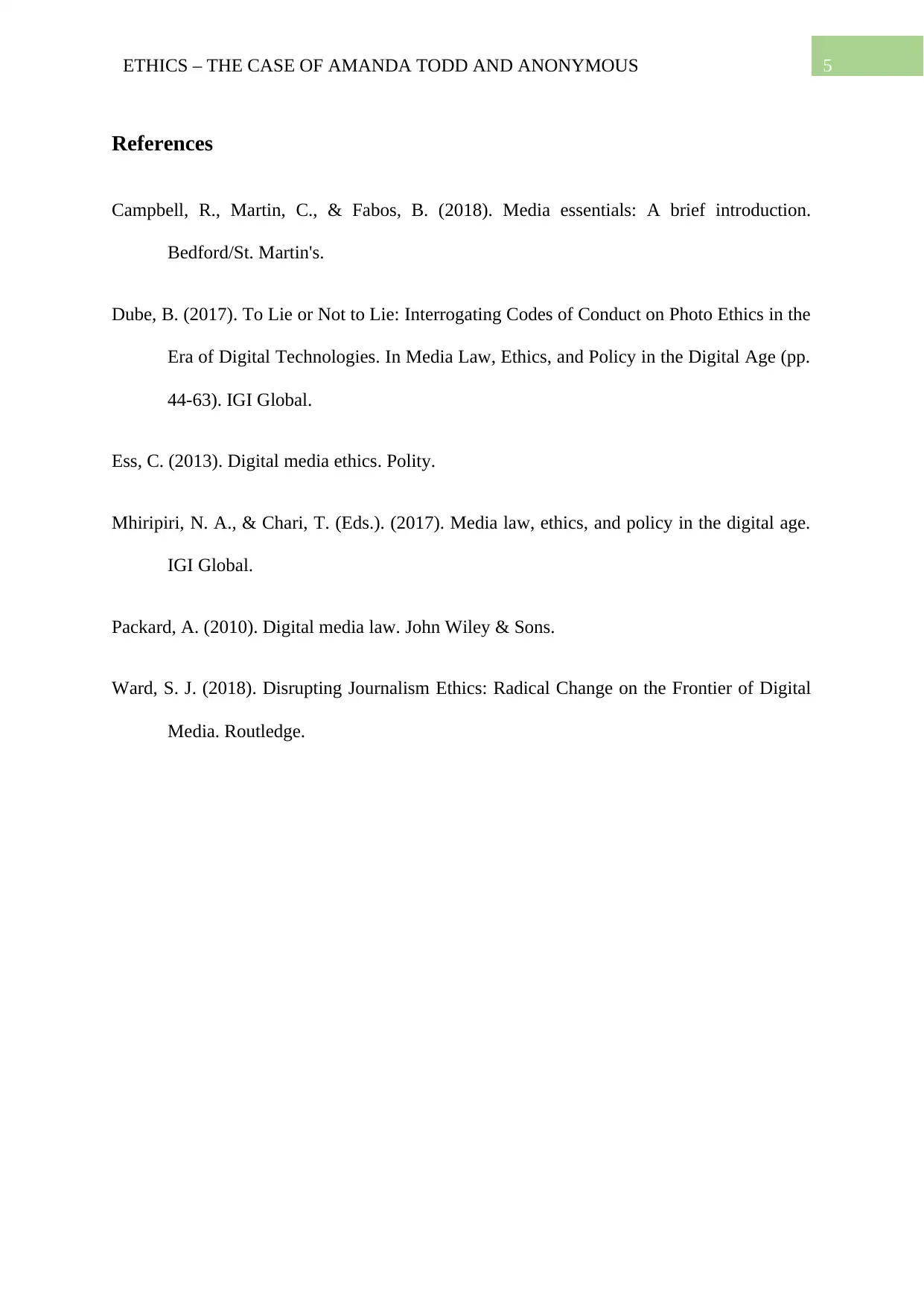
5ETHICS – THE CASE OF AMANDA TODD AND ANONYMOUS
References
Campbell, R., Martin, C., & Fabos, B. (2018). Media essentials: A brief introduction.
Bedford/St. Martin's.
Dube, B. (2017). To Lie or Not to Lie: Interrogating Codes of Conduct on Photo Ethics in the
Era of Digital Technologies. In Media Law, Ethics, and Policy in the Digital Age (pp.
44-63). IGI Global.
Ess, C. (2013). Digital media ethics. Polity.
Mhiripiri, N. A., & Chari, T. (Eds.). (2017). Media law, ethics, and policy in the digital age.
IGI Global.
Packard, A. (2010). Digital media law. John Wiley & Sons.
Ward, S. J. (2018). Disrupting Journalism Ethics: Radical Change on the Frontier of Digital
Media. Routledge.
References
Campbell, R., Martin, C., & Fabos, B. (2018). Media essentials: A brief introduction.
Bedford/St. Martin's.
Dube, B. (2017). To Lie or Not to Lie: Interrogating Codes of Conduct on Photo Ethics in the
Era of Digital Technologies. In Media Law, Ethics, and Policy in the Digital Age (pp.
44-63). IGI Global.
Ess, C. (2013). Digital media ethics. Polity.
Mhiripiri, N. A., & Chari, T. (Eds.). (2017). Media law, ethics, and policy in the digital age.
IGI Global.
Packard, A. (2010). Digital media law. John Wiley & Sons.
Ward, S. J. (2018). Disrupting Journalism Ethics: Radical Change on the Frontier of Digital
Media. Routledge.
⊘ This is a preview!⊘
Do you want full access?
Subscribe today to unlock all pages.

Trusted by 1+ million students worldwide
1 out of 6
Your All-in-One AI-Powered Toolkit for Academic Success.
+13062052269
info@desklib.com
Available 24*7 on WhatsApp / Email
![[object Object]](/_next/static/media/star-bottom.7253800d.svg)
Unlock your academic potential
Copyright © 2020–2025 A2Z Services. All Rights Reserved. Developed and managed by ZUCOL.
